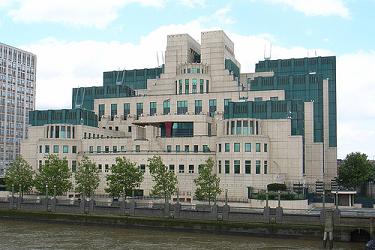Original URL: https://www.theregister.com/2008/09/25/interception_modernisation_bill/
UK.gov 'to drop' überdatabase from snoop Bill
Central snoop silo carries on regardless, sources say
Posted in Legal, 25th September 2008 11:30 GMT
Exclusive The government will drop plans for a massive central database to track private communications from the forthcoming Communications Data Bill, but officials will proceed with the multi-billion project in the background instead.
Senior civil servants will discreetly run the project to swerve potential political opposition to a scheme which would retain details of every phone call, email, and web browsing session of every UK citizen, sources have told The Register.
According to people familiar with the plans, the Home Secretary* will introduce the Bill to Parliament soon after MPs return from recess on October 6.

The HQ of the Secret Intelligence Service, AKA MI6
It will not overtly mandate a government-contolled universal database of electronic communications. But sources said the mandarins behind the "Interception Modernisation Programme" (IMP) are determined to go ahead despite concerns about its public spending and ethical implications from departments including the Treasury and Cabinet Office.
Spending would be allocated under the secret budgets that provide funding for the intelligence services.
Political manoeuvres
In August we reported that figures in the hundreds of millions of pounds range had been touted at exploratory meetings last year between IMP officials and the telecoms industry. It's understood that the total sums for procurement and operation of a central database now being discussed at Whitehall are well into the billions and larger than that earmarked for the much-delayed National ID Card Scheme.
Asked to confirm or deny that a central database would not appear in the Bill, the Home Office told The Register in a statement: "The Government has already published the draft legislative programme for the next session of Parliament. This included the Communications Data Bill. Proposals are being developed and full details of the Bill will be released once they have been completed."
The Communications Data Bill had been due to be published before the Westminster summer break. The delay meant the government's original plan to bundle the whole of the IMP with new EU directives requiring data retention by ISPs - announced by Gordon Brown in May - was dropped because the European rules have to be in force by March next year. Instead the Brussels directive will be transposed by statutory instrument, and the Communications Data Bill will standalone to legislate for the IMP.
But insiders believe ministers and senior officials are worried that a central database granting intelligence services and law enforcement unprecedented power to search and cross-reference mobile location data, phone calls, emails and web browsing would meet strong resistance from MPs and risk defeat for Labour. It's hoped that downplaying plans for a central database will mean a smoother parliamentary passage for the Communications Data Bill.
Statutory cover for the database could be provided later by a new government with fewer rebellious MPs. That scenario would mean this year's Communications Data Bill would focus on other elements of the IMP, such as updating wiretapping powers.
*Which may or may not be Jacqui Smith.
Private sector bonanza
A central silo for all retained communications data is viewed as a near-panacea for serious crime and terrorism by the intelligence services, MI6 and GCHQ, and the Serious and Organised Crime Agency (SOCA). Instantly searchable tables of who called or emailed whom and when are in many ways more powerful than obtaining the contents of internet communications or wiretapping, which often requires painstaking work by human analysts to infer useful meaning from conversations.

Sir Stephen Lander, once MI5 director-general,
now chairman of SOCA
However, the case made by central database advocates is that its help will "maintain [intelligence] capability" on communications data. It's argued that the rise of IP networks has eroded intelligence and law enforcement's ability to establish relationships between suspects.
Civil liberties groups are very concerned by the plans. The Open Rights Group (ORG), which campaigns on digital privacy issues, submitted a wide-ranging Freedom of Information Act request to the Home Office at the end of August. It asked for the minutes of meetings on the IMP, copies of correspondence and details of proposed technical architecture. Yesterday officials replied to say they had extended the deadline to respond to assess "the public interest in saying whether or not we hold the information you have requested". The response concluded: "This letter should not be taken as conclusive evidence that the information you have requested exists or does not exist."
ORG executive director Becky Hogge told The Register: "If these plans are true then it would represent a major qualitative change in the way the public are surveilled and the powers of the surveillance authorities. Any such change would need to be the subject of rigorous, informed public debate."
Despite potential resistance to a central database of communications, a source said SOCA has been nominated to initiate contact with private sector contractors, who are set to benefit from what would be one of the UK's largest ever IT projects. Serco, which already contracts on intelligence data analysis for the agency, is understood to be involved in moves to attract private bidders.
A SOCA spokeswoman said: "No tender or procurement process has begun. There's nothing happening". Serco had not responded to calls and emails requesting comment at time of publication. ®
Do you know more about the Interception Modernisation Programme? Contact the author.